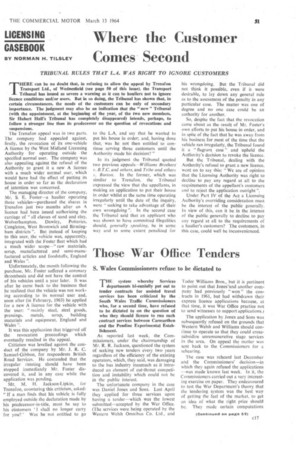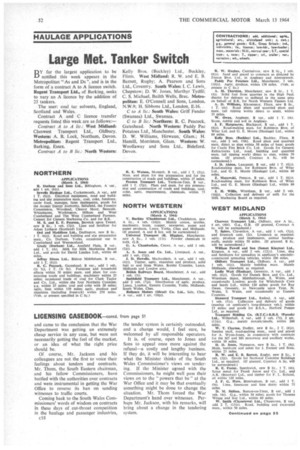Those War Office Tenders
Page 53

Page 54

If you've noticed an error in this article please click here to report it so we can fix it.
S. Wales Commissioners refuse to be dictated to
THE system whereby Services departments bi-ennially put out to tender contracts for assisted travel services has been criticized by the• South Wales Traffic Commissioners who, for a second time, have refused to be dictated to on the question of who they should license to run such contract services between Carmarthen and the Pendine Experimental Establishment.
As reported last week, the Commissioners, under the chairmanship of Mr. R. R. Jackson, questioned the system of seeking new tenders every two years regardless of the efficiency of the existing operators, which, they said, was damaging to the bus industry inasmuch as it introduced an element of cut-throat competition and instability which could not be in the public interest.
The unfortunate company in the case was Daniel Jones and Sons. Last April they applied for three services upon having a tender—which was the lowest submitted—accepted by the War Office. (The services were being operated by the Western Welsh Omnibus Co. Ltd., and Tudor Williams Bros., but it is pertinent to point out that Jones'and another company had previously "won" the con, tracts in 1961, but had withdrawn their express licence applications because, at that time, it was War Office practice not to send witnesses to support applications.) The application by Jones and Sons was subsequently refused on the grounds that Western Welsh and Williams should continue to operate so that they could crosssubsidize unrernunerative stage services in the area. On appeal the matter was sent back to the Commissioners for a rehearing.
The case was reheard last December and the Commissioners' decision—in which they again refused the applications —was made known last week. In it, the Commissioners carried out a very interesting exercise on paper. They endeavoured to test the War Department's theory that the tendering system was the best way of getting the feel of the market, to get an idea of what the right price should be. They made certain computations and came to the conclusion that the War Department was getting an extremely cheap service in any case, but were not necessarily getting the feel of the market, or an idea of what the right price should be.
Of course, Mr. Jackson and his colleagues are not the first to voice their feelings about tenders and contracts. Mr. Thom, the South Eastern chairman, and his fellow Commissioners, have battled with the authorities over contracts and were instrumental in getting the War Office to reverse its ban on sending witnesses to traffic courts.
Coming back to the South Wales Commissioners' words of wisdom on contracts in these days of. cut-throat competition in the haulage and passenger industries, c 18 the tender system is certainly outmoded, and a change would, I feel sure, be welcomed by all responsible operators.
It is, of course, open to Jones and Sons to appeal once more against the refusal-a costly and lengthy business. If they do, it will be interesting to hear what the Minister thinks of the South Wales Commissioner's views on tendering. If the Minister agreed with the Commissioners, he might well pass their views on to the "powers that be" at the War Office and it may be that eventually something might be done to change the situation. Mr. Thom forced the War Department's hand over witnesses. Perhaps Mr. Jackson, with his remarks, will bring about a change in the tendering system.








































































































































